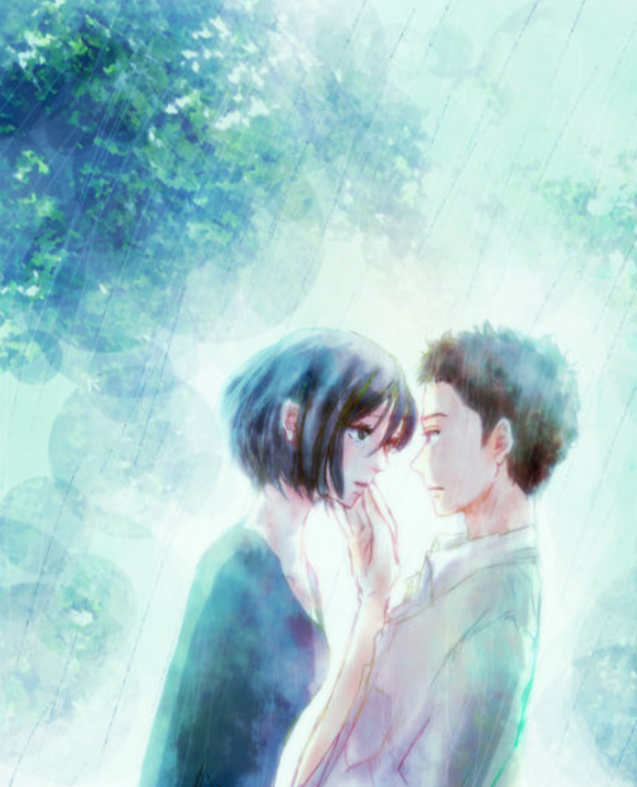
The Court of Words and leaves
The first time I saw Makoto Sinai was around 2008. At that time, my soul was a weak literary young man and my body was a fat black man. Because of this strange attribute, I can only pretend to be online and meet few girls in real life. See the first film is “seconds speed five centimeters”, this film is very famous, the story is not repeated. I didn’t know how to get along with people back then, and after watching this, I didn’t understand. Male and female protagonists of hide-and-seek ability is super God, face to face pull hand can be lost, a pair of do not play the dead man vowed not to give up posture. After reading touched, but feel love is too mysterious, has been beyond human reach.
So from an educational point of view, it was terrible.
Second Speed is one of Sinai’s most famous films; one of the most important is that “every frame can be used as a desktop”. This syntax has been used in several films, and when it is used too much it becomes an advanced black. The director did a good job of getting the cinematographer’s job.
Later, follow to see “the agreed place beyond the clouds”, “the children chasing the stars”, “the sound of the stars”, to see the discovery that Sinai Makoto will be three axes: the distant expanse of the sky, gurgling flowing streams, and forget the brain of the hero. His inability to tell stories only worsened as the production got bigger.
I think it has something to do with Sinai’s bad habits from the last few movies. He did his first few projects alone, 1999’s “The Far Side” and “Her and His World”, and 2003’s “Voice of the Stars” — all of which, except for the sound roles, were done by Sinai himself, from script to computer-generated Settings to animated editing. So we often see comments like “what can you expect from such a one-man animation”, Sinai’s omnipotence. Instead of being an advantage, he became a stumbling block when he entered the industry — after all, Sinai’s ability to tell stories was merely an entry point, like a literary-loving high school student who had ambitions to write countless stories but could only manage a handful of subjects.
In “The Court of Words Leaves,” we can see Sinai’s progress. While the film is still a little too hard to handle with multiple interactions, the rumor of a teacher at school on a Snowy night is brushed aside, which I don’t think is entirely intentional, but Sinai’s technical inability to handle it. But avoiding the climax, which I’m not good at, turns out to be the punch line in this story. The most obvious sign of Sinai’s progress is that he has come to understand the process of slowly testing and trusting each other.
What was the difference in Sinai’s original work? It was that he liked big, quiet scenes too much. We always think that Miyazaki Hayat also likes this, but in fact, it is not, Miyazaki Hayat’s narrative ability is very excellent, he tells the story with anger, gongs, drums and firecrackers, but he loves nature too much, go to the forest by himself set off firecrackers — the mountain more secluded. Sinai Makoto can’t, when he tells the story, the characters are static, is a piece of paper, at this time if put into the big scene, will make people feel that the story is pitiful. In “The Court of Words Leaves” Sinai learned this lesson, put the weak and small story in the same weak and small scene, slow fire, but can boil a pot of taste of thick soup. I can’t remember who said that the Japanese were particularly good at making ashrams in the shell of a snail, which would be perfect for “The Court of the Words Leaves”.
Sinai Makoto is very fond of the feeling of wanting to speak but stopping. From the failure of the previous several works, I think it may be because Sinai himself lacks the ability to write dialogues. In this film, this lack of ability has become a highlight of the achievement of the film. Initial hakodate teacher Yinchuan “Raytheon (な る か み) less の し ring (と よ) み て さ し haze も り rain drop ら ぬ か Jun を leave め む” is “wan yeti” short song, belongs to the question and answer. I found an excellent translation on the Internet “Thor small move, thorn Yun zero ye, you will stay”, it is very long. And filial piety male the lower part of the answer is the poem “Raytheon (な る か み) less の し ring (と よ) み て drop ら ず と も わ れ は leave ら む sister し leave め ば” translates as “thorn small move, although not zero, I will leave the younger sister of joining” – still need to say more?
This question and answer has written enough about the human feeling. If you follow Netsuke Suzuki’s theory (the Japanese don’t say “I love you,” they say “the moon is beautiful tonight”), Tamayo has already declared his love, and you just cast him out. But this confession is too ambiguous, afraid someone will not understand, so still need to let men eat a good card. I think men should also want to understand, this good card he is to eat set, to the rain expression later, the characters in a short time to listen to their own heart, to make the corresponding choice, and for Sinai honesty is really a huge progress. A few days ago, I remembered reading a novel written by a native. The story had a lot of interesting details, but the problem was that the people in the story had no intrinsic motivation to act spontaneously, just like the early stories of Makoto Sinai. Everyone refused to choose and just rolled forward with the story. I think a comparison between Makoto Sinai’s “Five Centimeters per Second” and “The Court of Words Leaves” can help you understand how important the inner drive of the characters is in a story.


